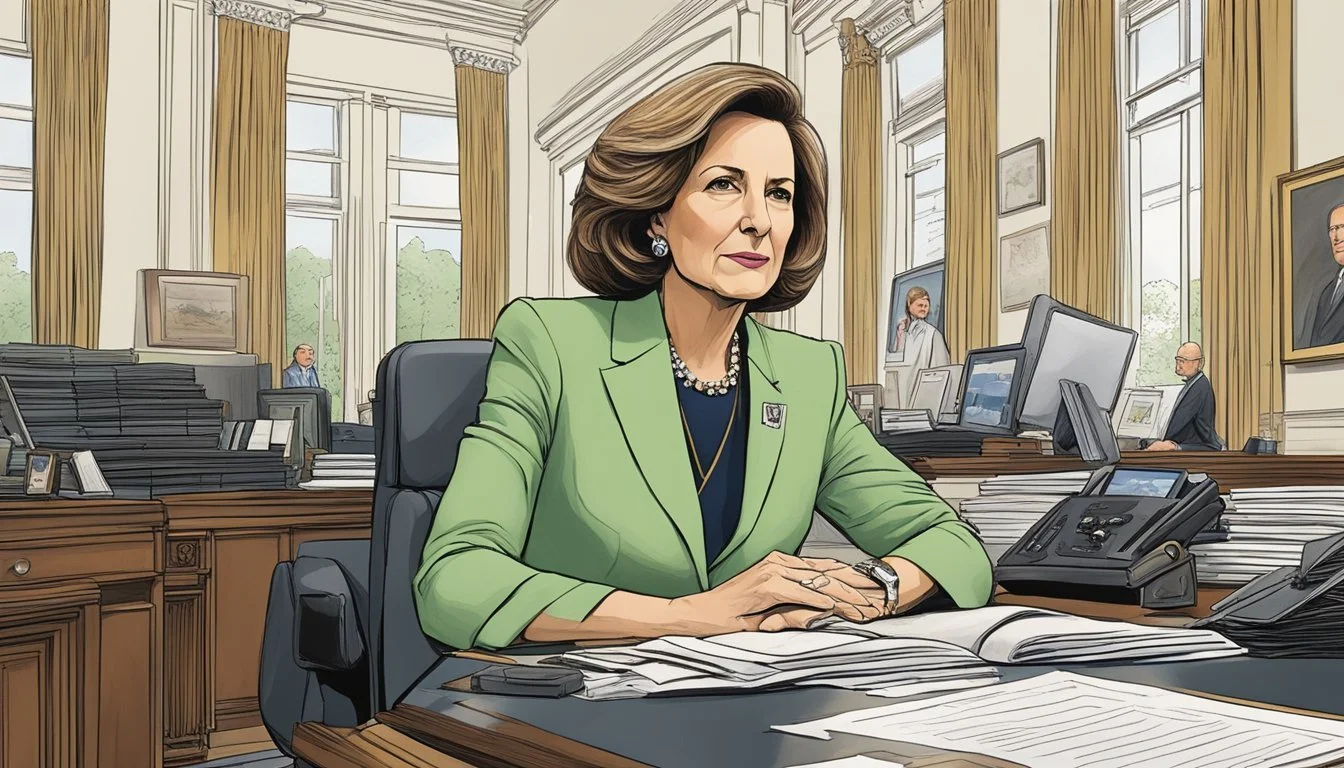The Role of Women in Power: Examining Leadership Dynamics in "The Night Agent"
"The Night Agent" on Netflix offers a compelling exploration of women in positions of power within the political thriller genre. The series showcases female characters navigating complex power dynamics and high-stakes situations in Washington D.C.
Hong Chau's portrayal of Diane Farr, the president's chief of staff, stands out as a nuanced depiction of a woman wielding significant influence in the political arena. Farr's character keeps viewers guessing about her true motivations, adding depth to the show's examination of power structures.
The series also features other female characters in key roles, contributing to a more balanced representation of gender in positions of authority. By presenting women as capable leaders and operatives, "The Night Agent" challenges traditional gender tropes often seen in political thrillers, offering a fresh perspective on power dynamics in government and intelligence agencies.
Portrayal of Women in Leadership Roles
"The Night Agent" showcases strong female characters in positions of power, challenging traditional gender stereotypes in political thrillers. The series presents nuanced portrayals of women navigating complex political landscapes and making critical decisions.
CIA Officer Rose Larkin
Rose Larkin, portrayed by Luciane Buchanan, emerges as a capable and resourceful CIA officer. Her character demonstrates intelligence and quick thinking in high-pressure situations. Larkin's role challenges the conventional male-dominated spy archetype.
She exhibits strong leadership qualities, often taking charge in dangerous scenarios. The series highlights her analytical skills and ability to piece together complex information. Larkin's character development showcases her growth from a tech expert to a field-ready operative.
Her interactions with male colleagues are depicted as professional and equal. The show emphasizes her competence without resorting to gender-based stereotypes.
Vice President Ashley Redfield
Hong Chau's portrayal of Vice President Ashley Redfield presents a powerful woman at the highest levels of government. Her character navigates the intricate world of White House politics with determination and skill.
Redfield's role explores the challenges faced by women in top political positions. The series depicts her making crucial decisions that impact national security. Her leadership style is shown as firm and decisive, commanding respect from her male counterparts.
The show delves into the personal sacrifices and pressures Redfield faces as a female leader. It explores the balance between her professional duties and personal life, adding depth to her character.
Women in the Face of Conspiracy
Female characters in "The Night Agent" demonstrate resilience and resourcefulness when confronting complex conspiracies. They play pivotal roles in uncovering hidden agendas and protecting national interests.
Defying the Mole Within the System
Rose Larkin, a civilian tech CEO, becomes entangled in a dangerous conspiracy. She uncovers a mole within the government, forcing her to navigate treacherous waters. Rose's technical expertise proves invaluable as she works alongside FBI agent Peter Sutherland.
Her skills allow her to analyze data and uncover crucial evidence. Rose's determination helps expose corrupt officials and their hidden agendas.
Catherine Weaver, a high-ranking government official, also faces difficult choices. She must balance her duty to the country with the realization that trusted colleagues may be compromised.
Weaver's position grants her access to sensitive information. She uses this knowledge to support the investigation while maintaining a facade of normalcy.
Confronting National Security Threats
The women in "The Night Agent" play key roles in addressing major security risks. They face dangerous situations involving foreign powers and domestic traitors.
Rose finds herself targeted by assassins due to her involvement. She displays courage and quick thinking to evade capture and protect vital intelligence.
FBI agent Chelsea Arrington takes on dangerous field assignments. She pursues leads related to the Iranian Ambassador, Navid Negahban, and his potential connection to the conspiracy.
Arrington's training and instincts allow her to gather crucial evidence. She works to unravel the complex web of international intrigue threatening national security.
These female characters demonstrate that women can be central figures in high-stakes political thrillers. They match their male counterparts in bravery, intelligence, and dedication to protecting their country.
Character Development and Relationships
Rose Larkin's journey in "The Night Agent" showcases her transformation and the complex relationships she forms. Her interactions with other agents shape her growth and reveal the nuanced dynamics within the intelligence community.
Character Evolution Through Crisis
Rose starts as a civilian thrust into a dangerous world of espionage. Her initial naivety gives way to sharp instincts and resilience as she faces life-threatening situations. Rose's quick thinking and adaptability become evident as she navigates complex political plots.
Her partnership with Peter Sutherland catalyzes significant personal growth. Through their shared experiences, Rose develops a deeper understanding of loyalty and sacrifice in the intelligence field.
The challenges Rose faces force her to confront her own values and beliefs. She emerges as a more confident and assertive individual, capable of making tough decisions under pressure.
Rose's Dynamic with Other Agents
Rose's interactions with seasoned agents like Amanda Warren reveal the intricacies of trust in high-stakes environments. Initially viewed with skepticism, Rose gradually earns respect through her actions and dedication.
Her relationship with Alice, another key figure, evolves from cautious alliance to mutual respect. This dynamic highlights the importance of female solidarity in a male-dominated field.
Rose's ability to form strategic partnerships while maintaining her moral compass sets her apart. Her genuine approach often contrasts with the more cynical attitudes of veteran agents, bringing a fresh perspective to operations.
These relationships test Rose's judgment and push her to refine her skills in reading people and situations. Her growth is reflected in how she navigates the complex web of alliances and rivalries within the agency.
Women Operating in Covert Roles
"The Night Agent" portrays women in complex covert roles, showcasing their skills and challenges in the world of espionage. These characters navigate dangerous missions and intricate power dynamics within intelligence agencies.
Undercover Operations and Tactics
Female agents in "The Night Agent" employ sophisticated undercover tactics. They blend into various environments, from high-society gatherings to corporate settings. These operatives use advanced technology and social engineering to gather classified information.
Women spies often leverage gender stereotypes to their advantage. They may pose as assistants or romantic interests to gain access to restricted areas or confidential data. Their training includes mastering multiple languages, combat skills, and quick thinking under pressure.
Covert communication methods are crucial. Female agents utilize dead drops, encrypted messages, and clandestine meetings to exchange intel. They must constantly adapt their strategies to avoid detection by enemy forces or double agents.
Gender Dynamics in Spy Operations
"The Night Agent" explores how gender influences spy operations. Female agents often face unique challenges and advantages in their missions. They may be underestimated by male counterparts or targets, allowing them to operate more freely in certain situations.
However, women in covert roles also confront gender-based discrimination within their agencies. They must prove their capabilities repeatedly and navigate complex office politics. The series depicts female agents supporting each other while competing for high-stakes assignments.
Sexual manipulation remains a controversial tactic in espionage. "The Night Agent" addresses this ethical dilemma, showing how female spies grapple with using intimacy as a tool for gathering intelligence. The psychological toll of such operations is explored in depth.
Representation and Performances
"The Night Agent" showcases talented actresses in complex roles that challenge stereotypes. The series provides a platform for diverse female characters to shine in positions of power and influence.
Acting Prowess in Pivotal Roles
Luciane Buchanan delivers a standout performance as Rose Larkin, a tech CEO thrust into a world of political intrigue. Her portrayal balances vulnerability with determination, bringing depth to the character's journey. Hong Chau impresses as Diane Farr, a formidable intelligence operative. Chau's nuanced acting conveys Farr's cunning and loyalty with subtle precision.
Arienne Mandi and Chelsea Arrington bring authenticity to their roles as White House staffers. Their performances highlight the challenges faced by women in high-pressure political environments. Fola Evans-Akingbola captivates as Maddie Redfield, showcasing her character's intelligence and adaptability.
Diversity and Casting Considerations
"The Night Agent" makes strides in diverse representation. The cast includes women from various ethnic backgrounds in prominent roles. This approach reflects a commitment to showcasing a range of perspectives and experiences.
The series avoids tokenism by giving these characters substantial storylines and complex motivations. Casting choices emphasize talent and suitability for roles rather than adhering to traditional stereotypes. This diversity extends beyond ethnicity to include age and body type, presenting a more realistic depiction of women in power.
The show's creators prioritized casting actresses who could portray strength and vulnerability in equal measure. This decision enhances the authenticity of the characters and their interactions within the political thriller genre.
Impact of Female Power on Story Progression
Female characters in "The Night Agent" wield significant influence, driving the plot forward through their actions and choices. Their strategic moves and crucial decisions shape the narrative in compelling ways.
Strategies Adopted by Female Characters
Rose Larkin emerges as a key strategist in the thriller series. Her tech expertise becomes a vital asset, allowing her to navigate complex digital landscapes. Rose's analytical skills help uncover hidden threats and piece together crucial information.
Other female characters employ various tactics to advance their agendas. Some use political connections to gain leverage, while others rely on their intelligence backgrounds to outmaneuver opponents.
Pivotal Decisions Shaping Outcomes
Female characters make critical choices that alter the course of events. Rose's decision to trust certain individuals while remaining cautious of others proves instrumental in uncovering the truth.
High-ranking female officials in the series face tough calls that impact national security. Their choices often carry far-reaching consequences, affecting both personal relationships and broader political landscapes.
These pivotal moments showcase the complex decision-making processes of female characters. They grapple with ethical dilemmas, weighing personal loyalties against professional duties.
Anticipations for Future Seasons
"The Night Agent" has set high expectations for its portrayal of powerful women. Future seasons are likely to build on this foundation, expanding character arcs and exploring new narrative directions.
Expectations for Women in Upcoming Narratives
Season 2 of "The Night Agent" is expected to premiere in Winter 2025. The showrunners will likely continue to feature strong female characters in pivotal roles. New storylines may introduce additional women in positions of authority within intelligence agencies or political spheres. The series could delve deeper into the challenges faced by these characters in male-dominated environments.
Fans anticipate more screen time for female agents and operatives, showcasing their skills and strategic thinking. The show may explore themes of mentorship between seasoned female professionals and younger colleagues. This could provide opportunities to address gender dynamics in high-stakes security situations.
Potential Character Arc Extensions
Rose Larkin's character development is expected to be a focal point in upcoming seasons. Her journey from a civilian tech CEO to a more active role in intelligence operations could be explored further. This arc may highlight the unique perspectives and skills women bring to national security.
The series might also expand on the backstories of established female characters, revealing past experiences that shaped their current positions of power. New alliances and rivalries between women in different agencies or political factions could add complexity to the narrative.
Character growth for male protagonists may include evolving attitudes towards women in leadership roles. This could reflect real-world progress in gender equality within government and security sectors.
Adaptation and Original Source Material
The Netflix series "The Night Agent" draws inspiration from Matthew Quirk's novel of the same name. This adaptation brings the book's thrilling world to life on screen, while making some key changes to enhance its visual storytelling.
Comparison Between the Novel and the Series
The TV adaptation of "The Night Agent" maintains the core premise of Matthew Quirk's novel but expands certain elements. In both versions, a low-level FBI agent becomes entangled in a high-stakes conspiracy. The series, however, develops the characters more fully, especially the female roles.
Rose Larkin, a key figure, gains additional depth and agency in the adaptation. Her tech expertise becomes more central to the plot, showcasing a woman in a traditionally male-dominated field.
The pacing of the series differs from the book, stretching out plot points to fit the episodic format. This allows for more intricate character development and relationship building.
Influence of Literature on Screen Portrayal
The literary source material significantly shapes the on-screen portrayal of women in power. Quirk's novel provides a foundation for strong female characters, which the series further enhances.
The adaptation takes cues from the book's depiction of women in intelligence roles. It builds on this by presenting more diverse and complex female characters in positions of authority.
The series expands on the literary themes of trust, loyalty, and power dynamics. This expansion allows for a more nuanced exploration of how women navigate and influence these aspects in high-pressure situations.
By drawing from and expanding upon the novel, the show creates a richer, more inclusive representation of women in the world of espionage and politics.









